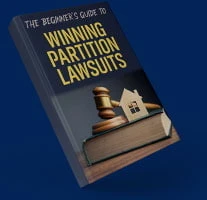Code of Civil Procedure Section 873.610 allows the court to impose terms and conditions on the partition sale. This statute is important because it provides that courts ultimately have broad authority in determining elements of partition sales, absent agreement from the parties.
Code of Civil Procedure section 873.610 states:
(a) The court may, at the time of trial or thereafter, prescribe such manner, terms, and conditions of sale not inconsistent with the provisions of this chapter as it deems proper for the particular property or sale.
(b) The court may refer the manner, terms, and conditions of sale to the referee for recommendation but shall not approve the referee’s report except following a hearing upon noticed motion.
(Amended by Stats. 1976, c. 73, p. 110, § 6.)
“Shawn” and “Julie” are an unmarried couple who want to start a life together. They find a nice home in Los Angeles and buy it as joint tenants. They move in and start their new life together.
Unfortunately, Shawn and Julie’s relationship doesn’t work out, and they break up. They cannot agree on what to do with the property. Shawn wants to sell all the property and move on with his life, so he sues for partition by sale.
Eventually, the court orders the property sold and the sale proceeds distributed. For the terms of the sale, the court orders that several necessary renovations are made to the property before it is sold at a public auction. The court also imposes restrictions on incoming bids. This is within the court’s power under CCP § 873.610.
1976 Addition
Section 873.610 is new; it makes clear the court’s authority to control the manner, terms, and conditions of sale. These include, but are not limited to, the following:
As is the case with almost all of the partition statutes, section 873.610 does not include a an “official” Assembly Committee Comment from the California Legislature. But this is not unusual. That’s because the Legislature endorsed an overall adoption of the Law Revision Commission suggestions when it passed the new partition statutes in 1976.
In fact, the introduction to Assembly Bill 1671 (the bill that contained the new partition laws) states that the Revision Commission’s recommendations “reflect the intent of the Assembly Committee… in approving the various provisions of Assembly Bill 1671.” This demonstrates that the intent of the Legislature was substantially in line with that of the Revision Commission.
As to the comment here, it should be praised for its level of depth provided in its explanations and examples. It lists out numerous conditions that court may choose to impose or not impose in partition sales based on the desires of the parties and equity. As such, this statute has not seen much in terms of published opinions attempting to interpret its language.
That said, there is a subtle element to this statute that tends to get overlooked, and that it that in prescribing the terms of the sale, the court must do so in a way “not inconsistent with the provisions of [the partition statute chapters].”
For example, in a case out of the First District Court of Appeal in 2017, the lower court ordered a partition sale in a unique way – first, the parties could bid against each other to purchase the property and take title independently, but if no party submitted a bid matching the minimum bid, then the property was to be listed and sold to the public. (Cummings v. Dessel (2017) 13 Cal.App.5th 589, 598.)
The Court of Appeal held this to be in error because the lower court impermissibly combined the provisions of partition by sale and partition by appraisal. Again, the court may adopt unique sales terms, but it cannot adopt terms that ignore the requirements imposed by other partition statutes, such as the requirement of posting notice of the sale.
